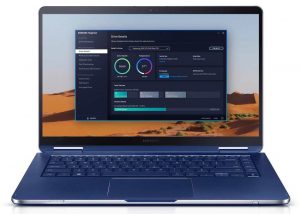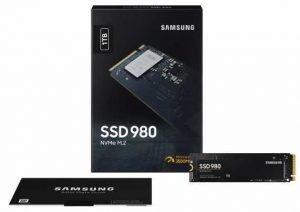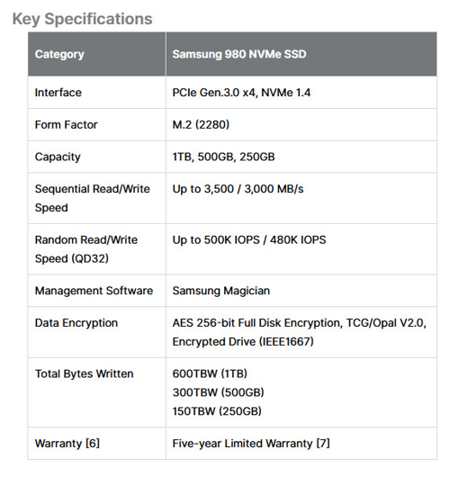Samsung 980 NVMe PCIe NVMe 1.4 M.2 2280 Up to 1TB SSD Without DRAM for Consumers
$50 (250GB), $70 (500GB) and $130 (1TB), up to 3,500 and 3,000MB/s RW
This is a Press Release edited by StorageNewsletter.com on March 16, 2021 at 2:32 pmSamsung Electronics America announced the 980 NVMe SSD [1], the company’s first consumer drive without DRAM.
Delivering the performance among DRAM-less SSDs [2], the 980 makes NVMe speeds more accessible to a range of users.
“Through both hardware and software innovations, our new 980 SSD brings greater value without compromising the high-end NVMe performance,” said KyuYoung Lee, VP, memory brand product business team. “The 980 offers an excellent blend of speed, power efficiency and reliability, making it suitable for everyday PC users and gamers as well as content creators.“
Previously, DRAM-less designs have presented a disadvantage in speed without the short-term memory at hand for fast access to data. The SSD 980 utilizes Host Memory Buffer (HMB) technology, which links the drive directly to the host processor’s DRAM to overcome any performance drawbacks. This technology, coupled with the company’s latest sixth-gen V-NAND as well as optimized controller and firmware, enables to provide NVMe performance with 6x the speed of SATA SSDs. Sequential read and write speeds come in at up to 3,500 and 3,000MB/s, while random read and write performances are rated as 500,000 IO/s and 480,000 IO/s [3], respectively.
The upgraded Intelligent TurboWrite 2.0 also offers enhanced sustained performance over the previous iteration [4] by allocating a much larger buffer storage area inside the drive.
Magician 6.3 software screen
Click to enlarge
For users working with large files or running graphics-heavy games, the ‘Full Power Mode’ added to the firm‘s Magician 6.3 software allows the drive to continuously run at peak performance for uninterrupted work and play.
Additionally, consumers will no longer have to worry about their drive overheating, thanks to its thermal designs. Users can enjoy stable and reliable performance even during prolonged use thanks to the same Dynamic Thermal Guard technology, nickel-coated controller and heat spreader label solutions available in the company‘s high-end 980 series.
The SSD also features improved power efficiency of up to 56% when compared to the previous 970 EVO,[5] allowing laptop users to better manage power usage.
The 980 SSD is available for a manufacturer’s suggested retail price of $49.99 for the 250GB, $69.99 for the 500GB and $129.99 for the 1TB.
[1] The NVMe design mark is a registered trademark of NVM Express, Inc.
[2] PCIe 3.0 NVMe DRAM-less SSDs, as of March 2021
[3] Performance may vary depending on the SSD’s firmware version and the system hardware and system configuration. Performance measurements are based on IOmeter 1.1.0. Sequential and random write performance were measured with Intelligent TurboWrite technology activated. Intelligent TurboWrite operates only within a specific data transfer size.
* Test system configuration: Intel Core i7-6700K CPU @ 4.00GHz, DDR4 2133MHz 8GBx2 OS-Windows 10 Pro 64bit Asrock Z-170 Extreme7+
[4] TurboWrite region has been increased, from up to 42GB in the 970 EVO to up to 160GB in the NVMe SSD 980
[5] Power efficiency (measured as IO/s/watts) improvement determined in comparison to the 970 EVO 1TB. Power consumption measured with IOmeter1.1.0 version with AMD Ryzen 3700X 8 Core @3.6GHz, DDR4 8GBx2, OS-Windows 10 Pro 64bit Chipset-GIGABYTE-X570-AORUS MASTER
[6] Samsung Electronics will not be responsible for any damages not covered by the limited warranty, including but not limited to any loss of data or other information stored on Samsung Electronics product or any loss of profit or revenue which may be incurred by user due to loss of data. More information on the limited warranty.
[7] Product covered for 5 years or until fulfillment of the TBW rating, whichever comes first.
Comments
A new SSD from Samsung is always a special event as this company is the indisputable historical WW leader in this field, in units as well as in capacity shipped.
The company is one of the few to have the advantage to build in-house flash chips as well as controllers. These chips are sold to a myriad of companies to build their own SSDs.
This time, the new Samsung 980 NVMe SSD, in M.2 2280 form factor and based on firm's V-NAND, offers good capacities, from 250GB to 1TB, at affordable prices, this later at $0.13 per gigabyte, especially as they don't incorporate D-RAM but use the host's processor DRAM as a cache. Speed is excellent with up to 3,500/3,000MB/s R/W transfer rate and 500,000 IO/s and 480,000 IO/s, respectively.
The 980 PRO, also in M.2 form factor and released last year, had better specs, with up to 2TB, 7,000/5,100MB/s R/W, but at a higher price ($0.3 per gigabyte for the 1TB model. More comparable, the 970 EVO Plus, announced 2 years ago, was not far than 3x more expansive and using much more power.
Samsung continues to expand the capacity of its SSDs much faster than HDDs and regularly lowering its prices. Remember than the Korean company was a HDD maker and has the good idea to exit from this business sold to Seagate in 2011 for $1.375 billion.
Below are all SSDs released by Samsung since the known first one in 2007, at this time with only 32GB in a 1.8-inch form factor. The company unveiled in 2006 the first PCs featuring 32GB SSDs built into the Sens Q30PLUS Note PC, and the Sens Q1 ultra-mobile PC. Concerning consumer SSDs, the firm entered in this sector in 2010 with the 830, which featured 20nm NAND flash and a dedicated controller in 2011, followed by the 840, with TLC NAND flash in 2012. 3D V-NAND appears in 2013 and was incorporated into 850 in 2014. First enterprise SSDs (1TB) began to be mass produced in 2013, followed by 15.36TB in 2016 and 30.72TB in 2018.
%3
| Year | Model | Form factor | From (GB) | To (GB) | Max. Transfer rate MB/s (read) | Max Transfer rate MB/s (write) | Interface | Price ($US) | For (GB) | Price per GB | Comments |
| 2007 | 32GB Flash-SSD | 1.8 | 32 | 53 | 50 | ||||||
| 2008 | 2.5 | 25 | 50 | 100 | 80 | SLC | |||||
| 2008 | 90 | 25 | SATA II | MLC; for PCs; 30% less than 2.5-inch in volume | |||||||
| 2008 | 16 | 90 | 45 | SATA II | MLC; for PCs; 30% less than 2.5-inch in volume | ||||||
| 2008 | 32 | 90 | 70 | SATA II | MLC; for PCs:, 30% less than 2.5-inch in volume | ||||||
| 2008 | 64GB Flash-SSD | 1.8 | 64 | 64 | 45 | 51nm process | |||||
| 2008 | 64GB SSD | 1.8 | 64 | ||||||||
| 2009 | 950 PRO SSD | M.2 | 256 | 512 | 2500 | 1500 | NVMe PCIe | 350 | 512 | 0.68 | V-NAND |
| 2009 | 256GB SSD | 1.8 & 2.5 | 256 | 200 | 160 | SATA II | 9.5mm high, MLC | ||||
| 2009 | 128GB SSD | 1.8 & 2.5 | 64 | 128 | 90 | 70 | SATA 3.0 | MLC | |||
| 2009 | PM953 | M.2 & 2.5 | 480 | 1920 | NVMe | 3D V-NAND | |||||
| 2010 | 2.5 | 512 | 250 | 220 | 3Gb SATA | 30nm MLC, for enterprise | |||||
| 2010 | SS805 | 2.5 | 100 | 230 | 180 | SLC | |||||
| 2010 | SATA mini-card SSD | 30x51x3.75mm | 16 | 64 | Mini PCie | ||||||
| 2011 | 2.5 | 100 | 400 | SLC | |||||||
| 2012 | Enterprise SSDs | 3.5 | 100 | 200 | 260 | 245 | 3Gb SATA | With toggle-mode DDR NAND | |||
| 2013 | NVM Express PCIe | 2.5 | 400 | 1600 | 3000 | NVMe PCIe | |||||
| 2013 | XP941 | M.2 | 128 | 512 | 1400 | PCIe 2.0 | 6 grams | ||||
| 2013 | SSD 840 Pro | 2.5 | 128 | 512 | 520 | 400 | 6Gb SATA | 450 | 512 | .88 | |
| 2013 | SM843 | 2.5 | 120 | 960 | 520 | 410 | 6Gb SATA | 21nm MLC | |||
| 2013 | EVO | 2.5 | 120 | 1000 | 520 | 540 | 6Gb SATA | 10nm 128Gb NAND | |||
| 2013 | mSATA SSDs | 51x30x3.8mm | 64 | 256 | 500 | 260 | 6Gb SATA | 20mm NAND | |||
| 2014 | SM1623 | 2.5 | 800 | 950 | 520 | 6Gb SATA | 10nm MLC | ||||
| 2014 | SM1625 | 2.5 | 100 | 800 | 925 | 595 | SAS | 20nm | |||
| 2014 | 850 PRO | 2.5 | 128 | 1000 | 550 | 520 | 6Gb SATA | 3D V-NAND | |||
| 2014 | 840 EVO mSATA | mSATA | 120 | 1000 | 540 | 520 | 10nm NAND | ||||
| 2014 | 845DC EVO | 2.5 | 240 | 960 | 530 | 410 | 6Gb SATA | 10nm 3-bit NAND | |||
| 2015 | PM1725 | HHHL-card | 3200 | 6400 | 5500 | 1800 | NVMe PCIe | 3D V-NAND | |||
| 2015 | SM1715 | PCIe | 1600 | 3200 | 3000 | 2200 | NVMe PCIe | 3D V- NAND | |||
| 2015 | SM951 | M.2 | 128 | 512 | 2150 | 1550 | PCIe | 10nm MLC NAND | |||
| 2015 | PM1633 | 2.5 | 480 | 3840 | 1100 | 1000 | 12Gb SAS | 3D V-NAND | |||
| 2015 | 850 PRO | 2.5, 7mm | 2000 | 550 | 520 | 6Gb SATA |

















 Subscribe to our free daily newsletter
Subscribe to our free daily newsletter


